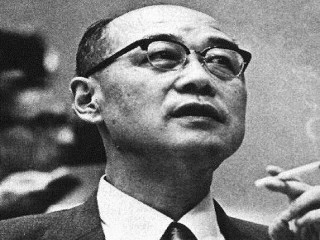
Hideki Yukawa biography
Date of birth : 1907-01-23
Date of death : 1981-09-08
Birthplace : Tokyo, Japan
Nationality : Japanese
Category : Science and Technology
Last modified : 2011-06-08
Credited as : Physicist, ,
Hideki Yukawa was born in Tokyo on Jan. 23, 1907. His father was a professor of geology at Kyoto University, and Yukawa grew up in an academically-oriented household which focused his attention on science from his early years. He entered Kyoto University in 1926, and, showing his intelligence early, graduated only three years later with a master's degree. Setting out on the long journey to academic achievement, Yukawa spent the next ten years continuing his education and teaching. First came three years of research, which was followed by a 1934 appointment as a physics lecturer at Kyoto University. Next, there was a move to a lecturer's post at Osaka University, where Yukawa completed his doctorate in physics in 1938.
By this time, Yukawa was already immersed in the study of sub-atomic particles that be his focus for the rest of his life. His first paper, "On the Interaction of Elementary Particles," met with a lukewarm reception when he presented it in Osaka at the 1934 meeting of the Physico-Mathematical Society. Nevertheless, he chose to publish it the following year, in the Society's Proceedings, Yukawa's paper postulated that, as an analogy to the way in which a particle of light may be exchanged between two charged particles in the "electromagnetic interaction," a new particle (later termed the meson) might be exchanged between two nucleons in the "nuclear interaction." The meson was envisioned by Yukawa to be a particle providing the "glue" for holding together the various other particles making up the nucleus of the atom.
The theory caused great interest in scientific circles, especially after such a particle was discovered in cosmic radiation by Carl Anderson, a 1936 Nobel laureate from the California Institute of Technology. Used together by researchers, the work of Yukawa and Anderson provided a noteworthy overture to the 1939 discovery of nuclear fission. Now an eminent scientist, Yukawa took his place in 1939 as Professor of Physics at Kyoto University. He taught there during World War II, which ended abruptly for Japan in 1945 with the shattering atomic destruction of Hiroshima and Nagasaki.
In 1948 he was invited to spend a year at Princeton University's Institute for Advanced Study. It was here that Yukawa met Albert Einstein, with whom he remained friendly for the rest of the older scientist's life. Quoted in Yukawa's own obituary in The Bulletin of the Atomic Scientists was an excerpt from his graceful epitaph for Einstein: "I feel very strongly that we have to take up his search and striving for world peace," a mission which Yukawa himself took extremely seriously.
His feeling that at least some of the responsibility for preventing war must rest with the scientists who produce its technology was strongly expressed once again in 1962, at the Kyoto Conference of Scientists. "The results of physics are inevitably connected with the problems of humanity through their application to human society," he warned. In 1975, at the 25th Pugwash International Symposium held in Kyoto, he took this theme even further. "Usually it has been thought that, particularly in pure science, it is desirable for its progress not to include any value criterion other than true-or-false. We physicists, by experience, have realized that the advent of nuclear weapons dealt a great blow to the above-mentioned way of thinking," he noted.
Yukawa's strong feelings on science's duty to humanity had begun to crystallize by 1949, when he won the Nobel Prize. He chose to donate most of his award money to several institutions in Japan, including the Research Institute for Fundamental Physics at Kyoto University, to which he returned in 1953 after three years at Columbia University. It was time, he said, to return to Japan to train "new faces." He remained there until 1970, when he retired.
Yukawa died at his home in Kyoto in 1981.
















